Sloafer is Lucy Herron’s shoe brand that she launched in 2018. The brand is a fresh and modern take that combines the style of a ballerina with the sole and comfort of a sneaker. Her shoes have since been worn by the Real Housewives of Beverly Hills cast members.
Lucy shares her uphill battles in building her footwear business in an industry she knew nothing about while pregnant. But don’t call her a mumpreneur – it’s a label she rejects!
Hi, Lucy. Thanks for your time today. Tell us about Sloafer and how the idea came about?
Sloafer brings together what I would wear (stylish flat shoes) with the comfort of what my husband would wear (sneakers).
When I was pregnant with our oldest child, my husband bought me a pair of raised ballet pumps that were supposed to be for added comfort. I had avoided wearing ballerinas because they’re generally badly made.
It doesn’t matter how much you spend on them; you can always feel the ground through them. While I appreciated the gesture, the shoes my husband bought were horrible.
My husband had bought them as an experiment as he thought we could design them better. I rolled my eyes thinking, that was silly, as we knew nothing about the footwear business. But he showed me some designs he did on his iPad. Although my husband’s a lawyer, he’s always been creative and artistic. He finally wore me down, and here we are with Sloafer five years later.
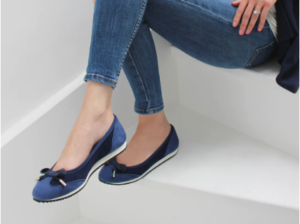
Sloafer is the perfect sneaker ballerina combination.
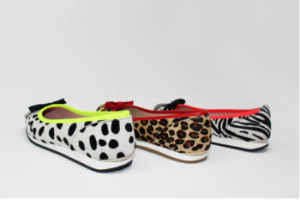
What made you want to start the business, as it sounds like you weren’t keen, to begin with?
My husband did have to convince me. I was four months pregnant at the time and had no interest in starting a business in an area we knew nothing about. But he pointed out that at some stage, I’d probably need to think about what I wanted to do once our son got older.
I’d run my own non-profit company but wasn’t keen to return to doing that full-time. I also didn’t want to go back to working for someone else. My husband suggested we use this time to invest in our future and build something of our own.
We started creating designs and looking up footwear agents on LinkedIn. We invested our savings in setting up the business.
I’m also the type of person that, once I commit to do something, I’m fully in, no matter how hard things get. You need that when running a business, as there’ll be many days when you feel like you’re pushing water up a hill.
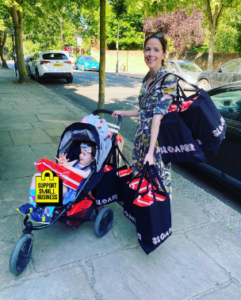
Lucy and the everyday realities of running her Sloafer business.
How has your business developed over the years?
We became a fear of missing out (FOMO) brand – by accident, really. It was down to not having a large start up budget or much working capital as a small business.
We’d produce 20 shoes in a particular style at a time because we couldn’t afford to make more. With a small batch, we’d tell people that once our shoes sold out, they’d be completely gone. At first, our customers didn’t believe how quickly they’d go, but once they missed out on a style they wanted, they realised it was true.
The standard sizes now sell out within weeks of a new style coming out. We still produce in small numbers, so once our shoes are gone, they’re gone until we bring out a new collection.
We’re always experimenting with new colours and materials. We like to be creative rather than churn out predictable styles. We recently started some evening styles too.
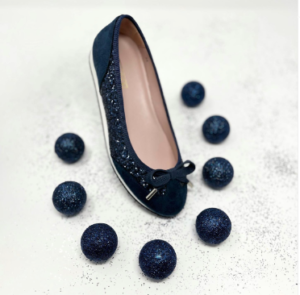
Add some sparkle in your life with a Sloafer from their evening collection.
One of your core brand values is that your shoes are handmade by workers who are paid a fair wage. Tell us why you feel strongly about that.
Unlike other mass shoe brands, our shoes are made by people who are paid a proper wage. We didn’t want to exacerbate the cost of living crisis.
Our shoes are a considered purchase. We understand that many of our customers have to think before they buy our products because they’re an investment in yourself and your wardrobe. They’re handmade shoes produced in Europe under responsible labour laws.
As women, we’re often on our feet all day. We’re running errands, caring for loved ones, or doing jobs such as nursing or social care that require us to be on our feet all day. Wearing comfortable shoes that we like and make us feel special is important.
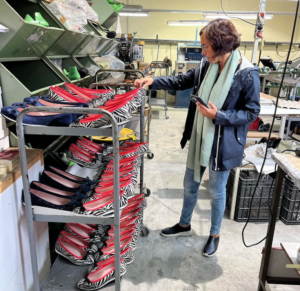
Lucy’s Sloafers are produced in a factory in Portugal.
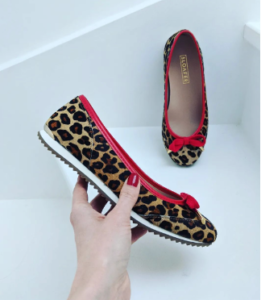
Sloafers are handmade in Europe by workers who aren’t exploited. The shoes are made for comfort and built to last for when you’re on your feet all day. They’re both an investment and a treat for your feet.
What do you think about being referred to as a mumpreneur (a mum who is an entrepreneur)?
I don’t like being called mum by anyone other than my kids. It’s annoying to just be seen as a mum when I had a full life before having kids. I don’t think I have more in common with another mum than I do a plumber who comes to fix something or someone I buy a sandwich from at lunchtime.
If I like you, I like you. Being pushed into a box because you have kids and a business seems unnecessary. I’m really not a fan of the term. We don’t feel the need to refer to dads as dad entrepreneurs. Let’s focus instead on our individuality as women. It also detracts from the achievements of those who aren’t mums.

Lucy is a mum of two kids but doesn’t like being shoved into a box of being a mumpreneur.
Why do you think the term mumpreneur has taken off and is used so much?
There’s a lot of money to be made from mumpreneurs and female founders. I could go to business events every day that target and claim to help businesses like mine. But why pay for such events and advice when that’s money I could use for my business. It’s become a market for people to make money from so they’re never truly going to have your best interest at heart.
What have been some low points in your journey with Sloafer?
The lows are constantly having to overcome obstacles.
For example, during Covid, e-commerce brands were getting good returns on investment (ROI) from their paid ads. But recently, Instagram has changed its algorithms (prioritising how users see content). Whether you’re a big or small brand, you’re no longer getting the same ROI. And as a smaller business, we’re getting priced out from being able to sell on Instagram.
We recently had to stop doing paid marketing because of cash flow. We get our working capital each month from the previous month’s sales. If we’ve a bad month, it impacts what we can invest in the next month.
Sales for Sloafer last month weren’t as good as we’d expected because of a lower marketing budget, so this has forced me to look at other ways to promote the business. I’ve been researching and speaking to as many people as possible to test different sales and marketing strategies. I’ve been having discovery calls and networking, which I wasn’t doing as much before because our paid marketing took care of that.
The lows are constantly having things thrown at you when you’re already down or just managed to pick yourself back up. Either it’s a cashflow problem, marketing, manufacturing or something else.
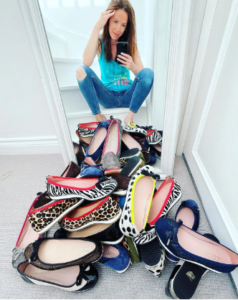
Lucy living the Sloafer shoe life.
Not having enough time to devote to the business is also an issue. With a limited number of hours in the day, there are so many things you know you should be doing, but you still don’t have the time.
I don’t get to work eight hours straight, undisturbed, like my husband when he’s at his office or works from home, as the kids know that dad’s working.
I’m not seen to ‘work’ because I’m always running around picking up the kids or getting dinner ready. I have all these interruptions throughout the day. I’m not sure my kids realise I “work” in the same way as their dad!
But he doesn’t get to go to our kids’ sports days, and what he earns is what keeps us with a roof over our heads, so he bears all of the financial responsibilities. You can quickly start to resent each other’s position. We’ve had honest conversations about this, and we’ve become better at acknowledging and appreciating the daily sacrifices we both make.
And what have been some of the highs?
I get a high every time my phone pings, and I’ve made a sale! Sometimes it’s someone who’s ordered three pairs of shoes. I think yes!!!
One of my absolute highs was when my idol Lisa Vanderpump from the Real Housewives of Beverly Hills wore my shoes.
I remember the day it happened. I was in my pyjamas, pouring some Weetabix, when I looked at my phone. It came up that Lisa Vanderpump had tagged me. I started screaming as I watched her dancing in my shoes on her Instagram story.
My phone was then pinging with all these new orders. To have someone you’ve watched on TV for years wear your shoes is incredible. Her daughter Pandora then wore them, and so did a cast member of the Vanderpump Rules.
Afterwards, I had to drop my kids at school and go to Tesco. It was back to reality.
But knowing that Lisa Vanderpump danced in my shoes in her Villa Rosa was everything!
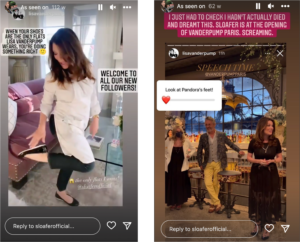
One of Lucy’s best moments – having Lisa Vanderpump and Pandora from the Real Housewives of Beverly Hills wear her shoes. Via @Sloaferofficial
What’s been your experience of using influencers to sell your products?
It’s been hard, and it does take time. It also doesn’t result in a massive ROI each time. But, it’s good content, as you need people wearing your products. If it’s just you wearing and promoting your product, it doesn’t have the same marketing effect.
I only follow and work with people I’m interested in. If people suggest I work with someone, I go on their social media feeds to see if our values align. If not, I can’t work with them even if they can help me sell our Sloafer products. I have to feel like you’re someone I would enjoy chatting with.
With Lisa Vanderpump, I’d been following her and her daughter Pandora for a few years. Pandora posted an outfit she wore on Halloween. I commented on her post to say she looked amazing. She wrote back saying nice shoes! I was blown away that she even responded. We began speaking, and that’s how that Sloafer partnership happened. It was through a natural and genuine interaction.
It can be tempting to send your products to all these influencers who claim they can skyrocket your sales. But then I think, why am I sending you all these free shoes that you can buy four times over?
I now partner with influencers and businesses with whom I’ve truly developed a relationship.
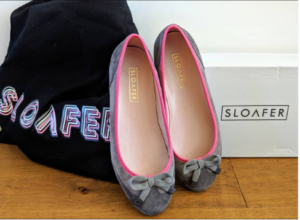
Do you find yourself comparing yourself to other brands?
It’s hard when you’re comparing yourself to others. It can make you feel bad about why your product isn’t doing as well, or why sales seem to come easier to some people than it does for us.
As a result, there are a few brands I’ve stopped following and comparing myself to even when they’re run by other mums. This is why I maintain the mum thing isn’t something that unites us – all our businesses, the journeys, the ups and downs, are totally different.
I also accept that Sloafer is not a mass-market brand. Our shoes mostly appeal to a demographic of Millennials and Gen X working women who aren’t always on Instagram.
There seems to be a growing trend of mum influencers. Why do you think that is?
I understand why the influencer market is big for women and especially for mothers to turn to. It’s hard finding work after you’ve had kids.
You’re limited even when you’re looking for work below your skillset. If you’ve been out of work for several years, finding a job is hard. And finding something with the hours and flexibility you need to work around your kids is virtually impossible. We end up taking whatever jobs we find which are poorly paid anyway. Plus, what we do get paid, all gets spent on childcare.
If you can make money by sticking your kids on Instagram and building a following, why wouldn’t you? It’s symptomatic of women generally being underpaid and undervalued.
That’s why a lot of mums become influencers. Some do it because they love it, for others, it’s out of necessity to work flexibly, on their own terms and earn some money. I completely respect that, although it’s not something I would do with my family as there’s too much information being shared.
But it’s acknowledging that everyone is on there for different reasons.
What advice would you give to anyone launching a new business? Is there anything you wish you’d known when you started Sloafer?
I would say get some basic financial training which I didn’t have to begin with.
Simple things like knowing to open a savings account next to your business account as it’s easy to spend everything you make. You need to understand how to budget and manage your cash flow.
When you’ve had a good sales month, producing more shoes is tempting. But then, when you have a bad month, you’ll have all these shoes but not the money to market them, as you’ve spent it all on buying your stock.
Retail-based businesses are notoriously difficult for managing stock. I read Shoe Dog by Phil Knight, Nike’s founder, who describes how they produced tens of thousands of units a month even though they had no cash in the bank. At the end of the month, they’d be panicking to make their sales, just like I often do.
Find as many free resources to get that financial training. If you don’t understand your numbers, you’re screwed. Learn about your revenue, net sales, gross sales, profit margins etc.
Enterprise Nation provides support for small businesses. They have loads of seminars and courses. You can even go on YouTube or LinkedIn for free tutorials.
We spent so much money on consultants and experts that it was a waste because they didn’t produce any results and we should have tried to do things ourselves.
At the beginning, learn and do everything yourself. I’m currently doing all our marketing and accounts until our cash flow improves. You should only outsource when business is good or once you’ve really made it. And even then, you’ll always have that knowledge to fall back on if you ever need to.
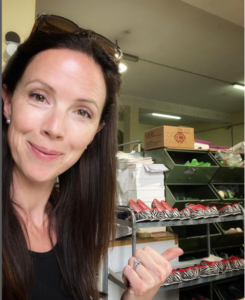
Lucy admits that managing her cash flow and stock is a constant challenge.
As women, we often get told we can have it all, and it’s about finding the right balance. Do you think that’s true?
I don’t think that’s true. You have what your circumstances allow you to have. You can’t go at every element of your life with 100% or even 50% sometimes.
Often, I think I won’t get this time back with my kids, so I want to focus my attention on them and not on the business. But if the business doesn’t succeed, we can’t provide for our children how we want to.
Other times, I want to focus on getting work done. If I’m really busy, my children might eat breaded chicken and cucumber for five days straight. I then end up feeling like a bad mum.
Something is always in turmoil. You can’t have it all and you shouldn’t try to. It’s completely unrealistic.
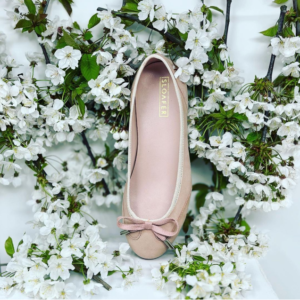
You can find Lucy’s Sloafers on their website or follow their Instagram at @Sloaferofficial.
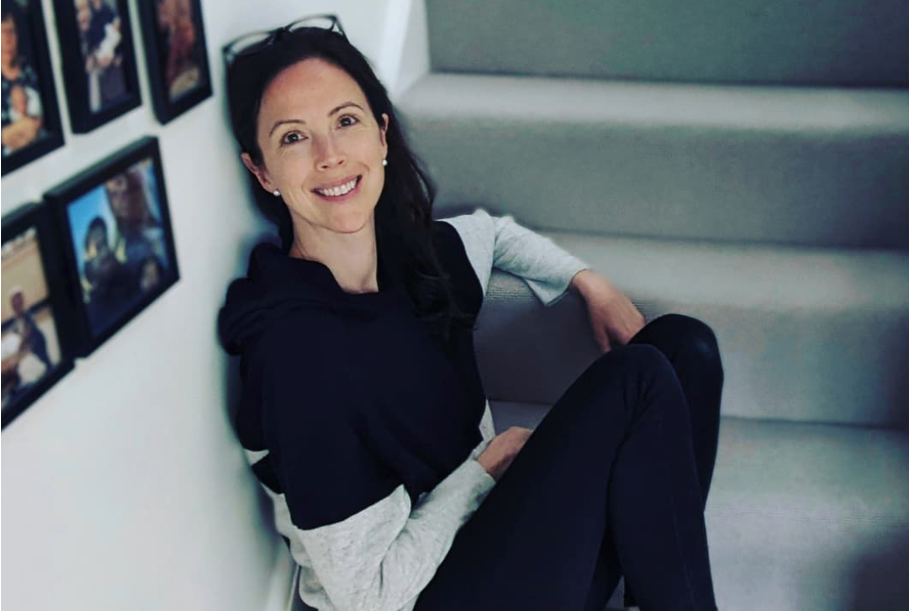
This is a great interview, first of all – i love comfy shoes so glad Lucy is tackling the market with some stylish options! Second of all, i love the honesty re; influencer market. Some people make it seem easy and love the idea of partnering with someone who aligns with your values and not just anyone! I know Lucy doesn’t like the term mumpreuner but its refreshing to see the female founder market is growing. Fantastic post and thanks to Lucy for being so honest about her experience x
Wow. What great feedback Stella. Thanks so much and we’ll be sure to pass these on to Lucy too! You’re right that comfortable stylish shoes are so important and overlooked. And Lucy really is refreshingly honest about everything 🙂
Wow what an amazing interview. I wish every success to the Sloafer brand and may it continue to grow!
Thanks so much Nathan! And we’ll be sure to pass on your well wishes to Lucy